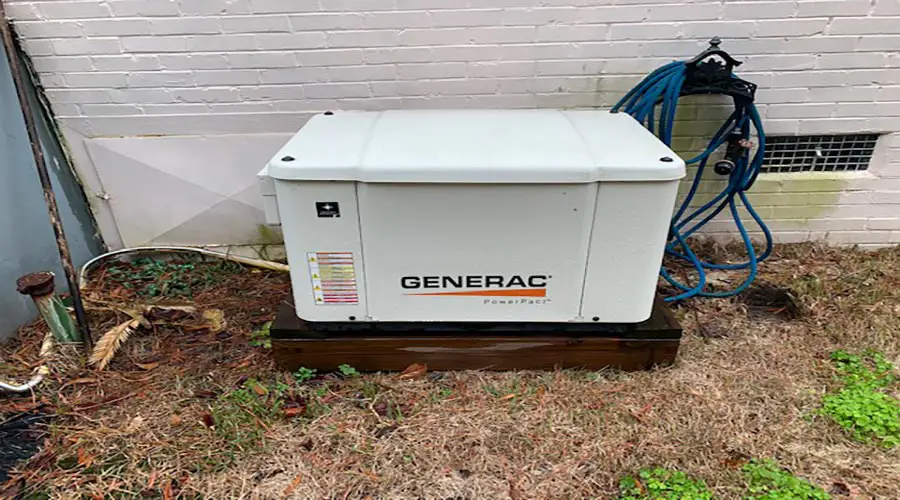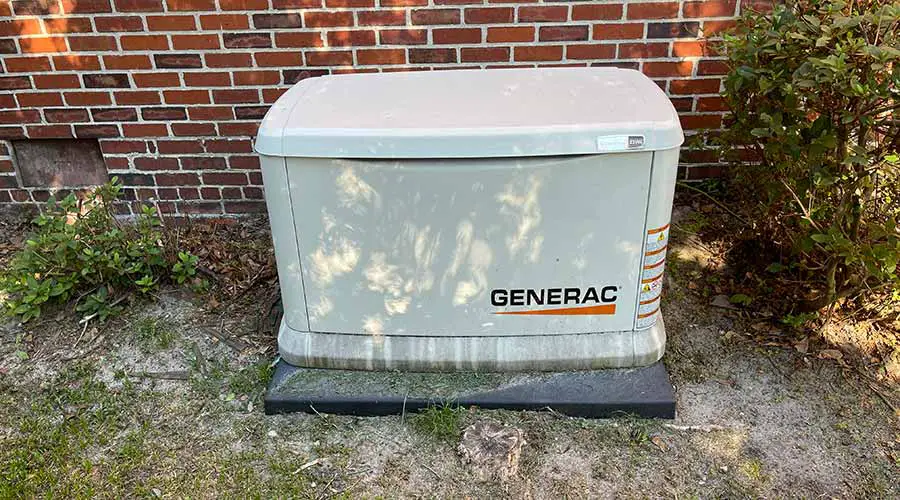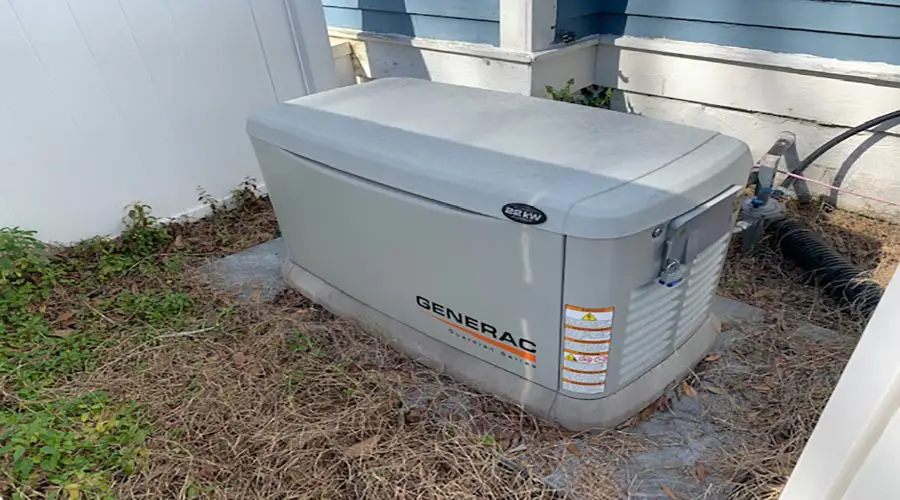
Completely silent generators are mythical creatures, but manufacturers are continually working on reducing their generators’ noise levels. This means that newer models are generally quieter than older models. To make meaningful comparisons, you need to look at generators with similar power outputs and fuel types.
Generac’s mid-range whole house generators, the Guardian Series, produces around 66dB – about as loud as an air conditioner condenser or normal conversation. Some Generac generators are even quieter, running at 58 dBA. Generac generators are some of the quietest when compared to similar brands.
The degree of noise made by a whole house generator depends on several factors, including the type of exhaust system, amount of soundproofing in the enclosure, the type and size of the engine, and the radiator fan’s design. When shopping for a quiet generator, there are several things to bear in mind.
The Noise Levels of Generac Generators
The U.S. standard for calculating a generator’s loudness is measured using a microphone 23 feet away from the generator.
The table below shows the loudness levels of various Generac generators:
| Generator Type | Fuel Type | Loudness |
| Generac 6462 Guardian Series | Natural gas or liquid propane | 58 dBA |
| Generac 6438 | Natural gas or liquid propane | 63dBA |
| Generac 7043 | Natural gas or liquid propane | 67 dBA |
| Generac 7042 | Natural gas or liquid propane | 67dBA |
| Generac 20kW Protector Series | Diesel | 70dBA |
The decibel scale is logarithmic, so a generator running at 70 dB is ten times louder than one running at 60dB. Noise levels above 85dB are considered harmful to human health. A quiet suburb with normal home noise is about 50 dBA, which means a generator with a noise rating between 50 and 60 dBA is fairly quiet.
The Generac 22000 Watt 7043 Home Generator is one of the most frequently recommended whole house generators. Its power output is sufficient to provide energy supply for the entire home, including appliances requiring higher wattage, such as air conditioning, heating, and stoves. This model puts out 22,000 watts when running on liquid propane and 19500 watts when connected to your natural gas supply.
With a power output of 11kW, Generac’s Guardian generator runs at 64 dBA, while comparable 12kW Briggs and Stratton and Kohler models were between 8 and 14 dBA louder. An 11 kW generator can power basic home circuits such as the fridge, sump pump, and garage doors. It will not power your whole house – only the essentials, but that is sometimes all you need.
Comparing the Noise Levels From Different Generators

The rule is usually that the larger the generator, the more noise it will produce. A 22kW generator will always be louder than a 12kW generator when running under an average load. You have to weigh your power needs against the noise factor.
If you need a generator to power your entire house, you may have no choice but to go for the 22 kW model with the higher noise levels. Some small generators can make more noise than larger ones, so it is best to read the manufacturer’s specifications if noise is an issue for you.
You need to look at the fuel type. Not everyone has natural gas piped into the home. If you don’t have a natural gas line in your home, you can choose between gasoline, propane, or diesel-powered generators. Propane generators are generally much quieter than diesel and gasoline generators. If it is difficult for you to get propane for some reason, you may have no alternative but to use a diesel-powered one.
It is not helpful to compare a generator that runs on diesel or gasoline with one that runs on natural gas because they have different engine types that make different noise levels. You need to choose a generator and then make noise comparisons between generators using the same fuel type.
The type of fuel you choose will be influenced by the fuels available in your area, the costs of the different fuels, the amount of fuel you can comfortably store, and the accessibility of fuel supplies when the power grid is down. It is dangerous to store large amounts of gasoline, so you may not want a whole house generator running on it.
These are typically your generator fuel choices:
- Natural gas
- Propane
- Gasoline
- Diesel
Generac makes a variety of whole house generators, including diesel-powered ones. Diesel-fueled generators are usually significantly louder than those fueled by natural gas or propane.
The Generac Protector Series diesel generator has an output of 20kW, which is enough to power a home. The sound level with the generator operating at normal mode is 70dBA, which can be fairly loud for some people and may violate noise laws in residential areas.
Generac produces the quietest 8kW and 12kW generators. Among the 20kW generators, Briggs & Stratton currently produces the quietest generator. Some people have complained that their Generac 20kW generators are noisier than the expected 67dB. You must remember that when a generator is tested for noise by the manufacturer, they place it in an open field.
You need to know where the generator will be located in your yard. Walls and other surfaces can amplify a generator’s sound, and a generator’s surroundings have a significant impact on its loudness. Many whole house generators are not enclosed in sound-attenuating structures when they are first installed.
The noise of a generator situated against walls or between buildings will travel further than a generator in an open field.
In North America, typically permitted noise levels during the day are around 60 dB(A) and at night 50 dB(A). However, local laws may vary from region to region.
Generally speaking, a generator should be run without a load once a week to ensure that it is ready to use when you need it. Generac generators are programmed to run in exercise mode on a schedule. They have a Quiet-Test® feature that reduces the weekly test engine speed, reducing the noise level to that of an idling car. In test mode, the engine only runs at two-thirds of its normal revs per minute.
How Generator Noise Is Measured

When an object vibrates, it emits sound waves (essentially pressure waves) into the air. Sound can become painful, uncomfortable, or annoying when the pressure wave’s amplitude exceeds the threshold level. A generator engine has moving parts that cause vibrations in the air around it, making noise.
The decibel (dB) scale describes the sound level. There are two dB scales:
- dB(L) – measurement is on a linear scale that treats all frequencies as an equal value. The ear is sensitive to ranges between 1,000 to 4,000 Hertz per second.
- dB(A) – measurement is based on what the human ear hears. The scale is weighted and more accurately reflects what the ear experiences.
The dB(A) scale is the one used for measuring the noise levels of generators. Noise levels from 80 to 100 dB(A) are considered very loud, 100 to 125 dB(A) uncomfortable, and 140 dB(A) causes pain. Some people have a lower noise tolerance than others and may feel pain at lower decibels.
A vacuum cleaner usually runs between 60-85 decibels, while window air conditioners or electric lawn mowers generate between 80-89 decibels. The issue is not only with the decibel levels but also the duration of the sound. A vacuum cleaner running at 67 decibels only has to be tolerated for a few hours, whereas a generator running at 67 decibels continuously for three days is a very different experience. It might annoy you and the neighbors.
Generally speaking, the higher the decibel level, the shorter the human tolerance time. You can listen to a sound at 85 dBA for up to 8 hours. If that sound goes up to 88 dBA, it is safe to listen to it for only 4 hours.
How to Reduce the Noise From a Standby Generator
You can get a variety of enclosures for a standby generator that provides weather protection and sound attenuation. Usually, the sound-attenuating chambers don’t come standard with the generator, and you have to buy them afterward. Sound-attenuated enclosures have adhesive-backed acoustic foam panels that absorb the sound and are resistant to oil and water.
Conclusions
Generac whole house generators are relatively quiet, but it depends on the kind of fuel they use and their size. Generac propane or natural gas-powered generators are quieter than Generac’s diesel-powered generators. When buying a generator, there is always a trade-off between its power output and its noise level.

